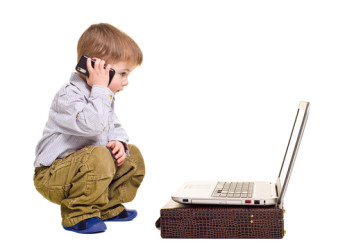Does Having a Baby in Your 30s Really Mean a Smarter Kid?
 There was a study published a few years ago offering some evidence that having a baby in your 30s would result in a smarter kid, smarter than your 20s or your 40s. It is making its way around the internet waves again. Also, if it rains on your wedding, it is good luck, so is getting pooped on by a bird. Sometimes I wonder if we don’t manipulate the information to make ourselves feel better. From a mother’s perspective, the 20s are definitely a healthier time to have a baby. Quite simply, you are younger. From an evolutionary standpoint, you should be a cave-grandma by the time you are in your mid-30s. I had Madelyn shortly after I turned 28 and Serena at 29. Compared to having the twins at 36, they were cakewalk pregnancies. On top of that, I am going to look so much better at the girls’ college graduations. The boys are going to have to hold me up at theirs’. Sometimes, I wish I had kids even younger.
There was a study published a few years ago offering some evidence that having a baby in your 30s would result in a smarter kid, smarter than your 20s or your 40s. It is making its way around the internet waves again. Also, if it rains on your wedding, it is good luck, so is getting pooped on by a bird. Sometimes I wonder if we don’t manipulate the information to make ourselves feel better. From a mother’s perspective, the 20s are definitely a healthier time to have a baby. Quite simply, you are younger. From an evolutionary standpoint, you should be a cave-grandma by the time you are in your mid-30s. I had Madelyn shortly after I turned 28 and Serena at 29. Compared to having the twins at 36, they were cakewalk pregnancies. On top of that, I am going to look so much better at the girls’ college graduations. The boys are going to have to hold me up at theirs’. Sometimes, I wish I had kids even younger.
For lots of reasons, many women are putting off having kids until their 30s — love, career, adventure, seeds to sow, etc. This study gives us a reason to feel good about it, so it will get lots of attention. We are a species that likes to feel good about ourselves. The rationale the scientists offer is that since most women in their 30s have already established careers, they can spend more time with their children, and they play with their kids more than mothers in their 40s.
I don’t know if I buy it. I’ve read studies about kids’ intelligence corresponding with the mother’s level of education, how much a mom works, how much TV they watch, what they eat, where they sleep, how they poop and more. It all feels very orchestrated, each interpretation of the data designed to appease a certain demographic.
If I’ve learned anything from having five kids, it is at birth, they are each pretty much who they are going to be, and I can only help navigate. While I’m not sure about this particular study, I do have a takeaway. Children do better when they are around real people who speak to them in a real way. All kids are smart in their own way, and they are little sponges when it comes to information. When you can (and do NOT beat yourself up when you cannot,) talk with them, play with them, engage them. Just as important, leave them to their own devices and let them explore. Don’t use baby talk with them. Don’t refer to yourself or to them in the third person. Challenge them. Treat them with respect, they will respond in kind. Just like any talent, you can nurture intelligence, but you cannot will it to be.
Are Cyber-Friends, Cyber-Bullies and Fake-Likes
Causing Communication Anxiety for Your Kids?
Have Our Kids Lost the Art of Conversation?!?!
Tracking Your Teen, The Dark Side

The Danger of Turning Our Kids into Stars























